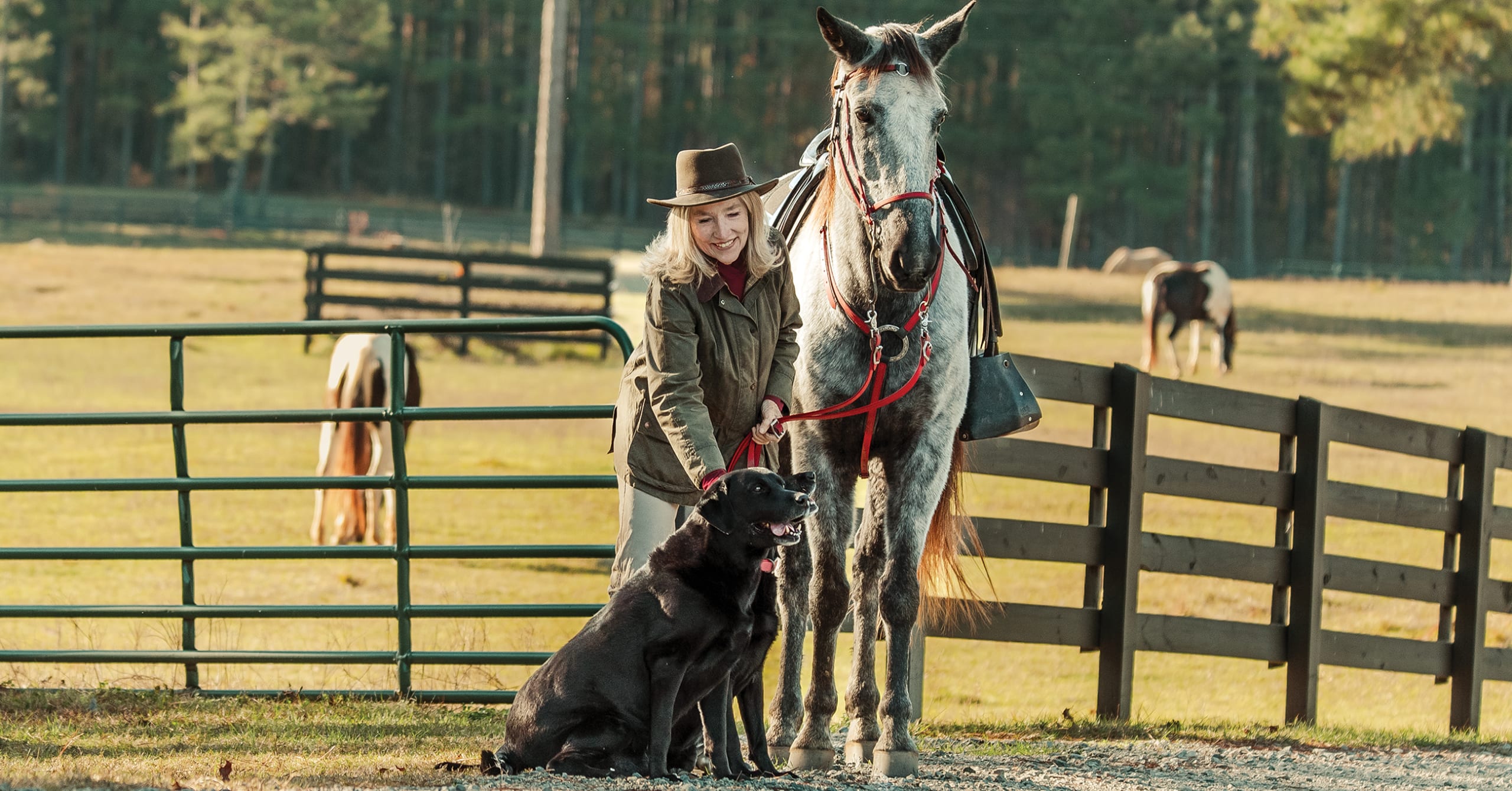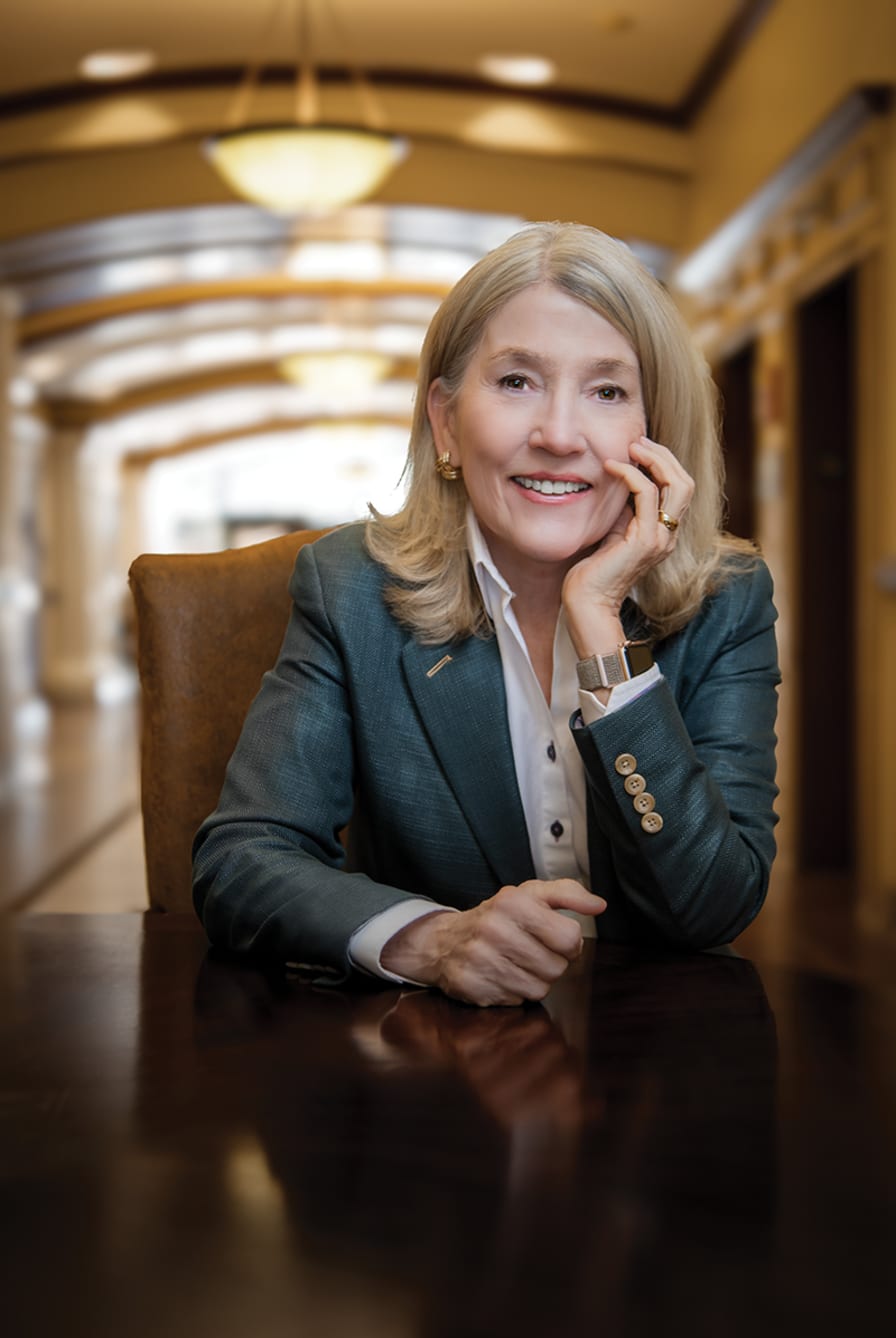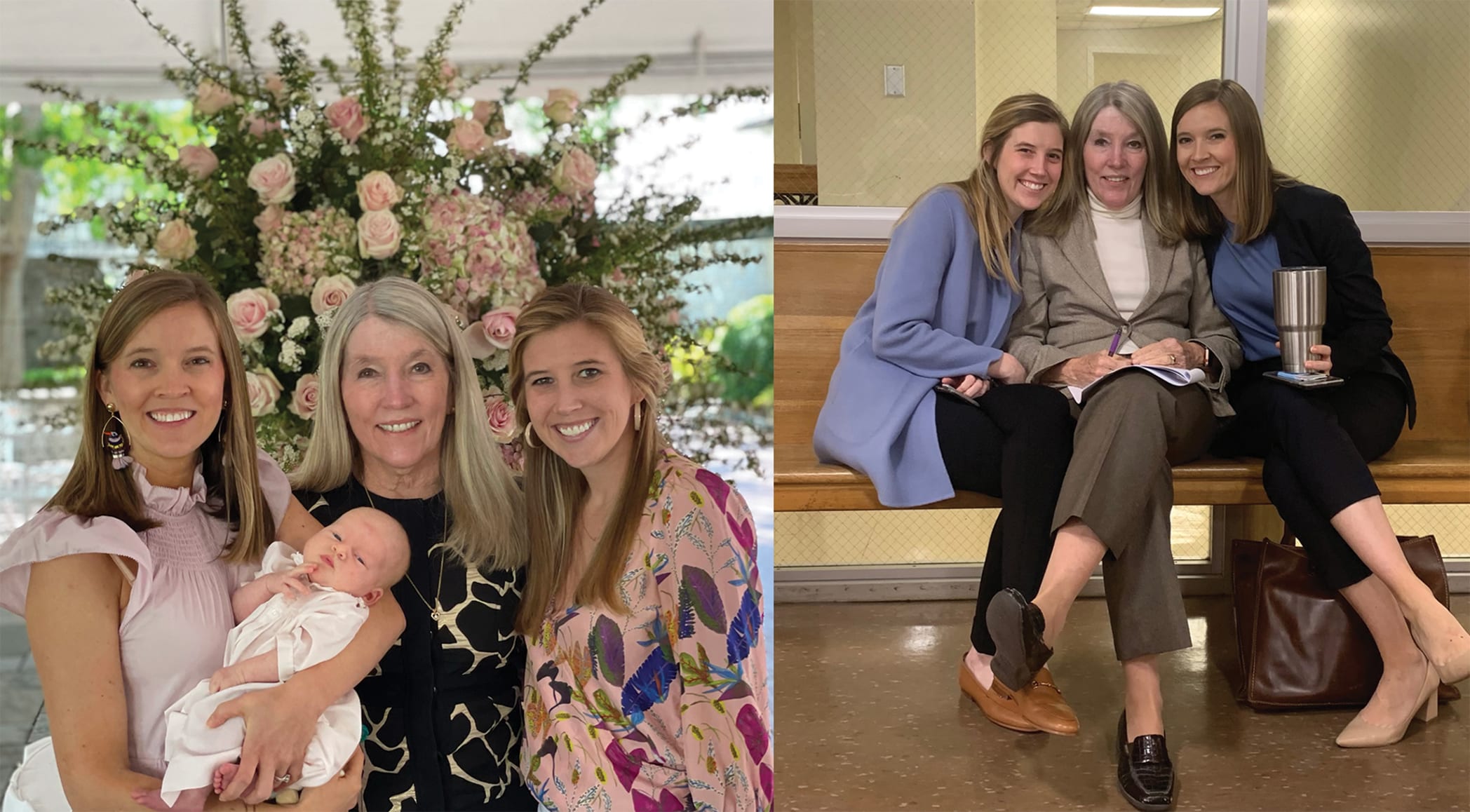Helping Juries See the Why

Helping Juries See the Why
Katherine McArthur has spent much of her 44-year legal career running from failure. And that has made all the difference.
“When I get into a case, I never set out thinking, ‘I’m the badass lawyer and I’m going to kick the other side’s rear,’” says McArthur, founder and owner of the McArthur Law Firm in Macon and Atlanta. “I’m more likely to think, ‘How am I going to lose this case?’ Because I’m always running from failure. That’s what keeps me on my toes. I can’t bear to let my clients down.”
Since launching her firm in 2007, McArthur has won more than $350 million in verdicts and settlements for her plaintiff clients. “I consider myself a perfectionist,” she says. “And one of the things about being a perfectionist is that when you are so concerned with failing, you don’t fail very often.”
Colleagues seem to agree. “I used to joke that you could take one of Kathy’s trial notebooks and give it to a third-year law student and they could try the case,” says plaintiff attorney W. Carl Reynolds. “That’s how thorough she is.”
Matt Coles, co-founder of Coles Barton, a Lawrenceville-based civil defense litigation firm, says McArthur comes across as self-assured without seeming cocky. “If I had my druthers, she’s one of the plaintiff lawyers that I would not have to come up against,” he says. “Nothing gets in her way—she’s absolutely zealous about achieving what she views as the proper result for her client.”
She’s come a long way since a college aptitude test suggested her best career options were a tossup between dietician and the Navy.
Her father, John McArthur, was in the Merchant Marines when he met and married Mary Elizabeth Robertson. Everyone called her Betty and him Mack, and after the war they built a four-room motel in Wilson, North Carolina, about 45 miles east of Raleigh and halfway between New York and Florida for vacationing snowbirds. It eventually expanded to 18 rooms.
McArthur and her older brothers, Pat (a child psychiatrist in South Carolina) and Mike (a retired clerk of court in North Carolina), grew up in a barracks building that had been moved from a nearby Air Force base. She spent her childhood meeting itinerant strangers. “People of all races and walks of life,” she recalls. “An invaluable experience for a future trial lawyer.”
Despite being the editor of her high school newspaper, McArthur didn’t consider journalism as a potential career when she entered the University of North Carolina as an undergrad. She was smart, so she thought she was supposed to be a doctor. But she hated chemistry and labs. Pharmacy? Same. She ended up majoring in business with a marketing emphasis, but during her junior year, after interviewing with several companies, she wondered: Is this what I want my life to be? “It just didn’t interest me,” she says.
The aptitude test wasn’t helpful, either. “But a guy I was dating at the time was taking the LSAT and planning on law school. That sounded interesting. At least, it would give me a direction for the next three years. Because honestly, I had no idea what I was doing.”

While at UNC’s law school, McArthur married Frank Schwartz, and after graduation the couple moved to Macon so he could take a job teaching at a nearby college. They divorced in 1980, but she decided to stay in Macon after landing a job as a law clerk at the firm of Mullis, Reynolds, Marshall, Horne & Phillips, where she wound up being mentored by senior partner Carl Reynolds.
“When I started there were very few female trial lawyers, so it was the opportunity of a lifetime for me to learn from Carl and get the trial experience that I got during those years,” she says.
Reynolds didn’t treat her with any kid gloves. As she left to take the two-day Georgia Bar exam in February 1980, his parting words were: “Don’t fail—I don’t want to be associated with a loser.”
“He had voiced my greatest fear,” says McArthur.
Early on, she did it all—title searches, real estate, uncontested divorces—but she fell in love with the PI plaintiff work Reynolds was involved in.
“I loved the idea of working with injured people, helping them through a terrible time, helping them find the answers they needed,” says McArthur, who quickly became the point person in the Reynolds-McArthur partnership. “Meeting the clients, learning about their lives. I enjoyed that, and I’m good at it. I’m not really a social butterfly at all, but I think that my upbringing in the motel business and meeting so many different people helped me develop those skills.”
Together, the two tried all kinds of cases—medical malpractice, trucking accidents, brain injuries—winning many multi-million-dollar verdicts and settlements. It was a hectic time. They were much in demand. McArthur remembers once when she and Reynolds had to leave a trial in Henry County while the jury was still deliberating, to catch a plane for Aspen, Colorado, where they were going through voir dire the next day. “We won both cases,” she says.
Along the way, McArthur married again and had two daughters. While she was making a name for herself alongside Reynolds, McArthur was also partnering with her husband, local tennis pro Randy Stephens, to become a doubles champion. The two were eventually ranked No. 1 in open mixed doubles and 35-and-over mixed doubles by the Georgia chapter of the United States Tennis Association.
“I was pretty good back then,” says McArthur, who also served as president of the Macon Tennis Association. “At the time, I had more tennis friends than lawyer friends. That has changed.”
Eventually both partnerships ended. She and Randy divorced in 2000, while the law firm went through its own series of schisms, splitting several times. Eventually McArthur split, too. “I felt I should make equal money to Carl,” she says. “I needed to prove to myself that I could draw business while also solving the issue over income disparity.”
So in 2007, she built a firm of her own.
Asked if any of those failures she ran from ever caught her, she pauses for a moment. “There have been cases that I’ve lost,” she says. “And you can put down two divorces.” With a smile, she adds, “But I’m a third-time winner there.”
She and Waldo Floyd dated for four months before marrying in 2005. An internationally known hand surgeon based in Macon, McArthur had deposed him as an expert witness several times. She’d even sued him once for a mistake one of his assistants made that resulted in a dentist losing a finger. “Waldo was eventually dismissed from the case, but after all these years it’s still fun to tell people, ‘It’s just business with us, nothing personal,’” says McArthur.
Her own business is certainly personal, particularly with daughters, Lindsey Macon, 33, and Holly Stephens, 29, now working as attorneys at the firm.
Holly came on board in the fall of 2023 after working in the Glynn County public defender’s office in Brunswick. Lindsey left King & Spalding in 2019 to team up with her mother.
“Mom’s joy and passion about her work always came through, so I pretty much always wanted to be a lawyer,” says Lindsey, who works most of the firm’s medical malpractice cases with McArthur. “We always knew about Mom’s cases—she would come home and talk about them. I knew many of her clients. Many of them became close with Mom, so I knew these people growing up, and knew how she was helping them. From a very early age, I felt connected to her work.”
Holly, at first, resisted the notion of becoming a lawyer. “That was my sister’s path, I thought, not mine,” she says.
A political science major, she spent two years working as a legislative aid before McArthur convinced Holly that her writing skills would come in handy as a lawyer. Since joining the firm, sitting in a courtroom and working a trial with her mother, she’s gained a whole new level of respect. One case, a client severely injured in an auto accident, stands out for her. “The defense accused my mom of training young attorneys poorly—calling out me and another young lawyer on the case,” Holly says.
How did McArthur answer back? She didn’t.
“It was so powerful watching her respond with such class to someone attacking her,” Holly says. “She’s not stooping to the level of other people—where a mean comment could have gotten a rise out of somebody. She just didn’t react.”
Then she gave the closing argument and won $715,000 for her client.
“She can be detailed and press very hard, but she does it in a way that does not alienate a jury,” says Paul Weathington, who has opposed McArthur in the past. “She’s got a good way of being tenacious without being over the top.”
Adds Coles: “She stands up but doesn’t rush in, doesn’t rush the emotion—no, she waits until the right moment, when she’s earned it with the jury,” he says. “There are some trial lawyers that start going 100 miles an hour immediately, throwing verbal bombshells, yelling and screaming from the first moment. I think that’s a mistake. But Kathy takes a nuanced, balanced approach. She’s honed the art of always leaving the jury with the impression that she’s being fair and impartial and reasonable.”
“I try to let the facts speak, and they have to be persuasive,” McArthur says. “I see myself as a teacher or adviser to the jury, a Girl Scout helping people understand what happened, and understand what seems so clear to me. That’s the key. If I’m not convinced, how am I going to convince a jury?”
Generally, she does. McArthur can walk jurors through a complex case step by step until they understand why catastrophic accidents can happen, even when smart people like physicians are involved. She helps juries see the why.
In an early 2023 case, a patient died following a procedure that began as a polyp removal. During the procedure, the surgeons—one of whom had very little knowledge of the patient’s history—discovered a cancerous tumor. They converted the operation to tumor removal, then accidentally cut a major artery.
“We asked ourselves: Why did this happen? And the simple answer is: poor planning before the surgery, because the team knew this was an unusual spot for a polyp,” says McArthur. “They needed to do an MRI scan to properly map the anatomy of that area. So now we ask, ‘Why no MRI before the surgery?’”
It was part of McArthur’s usual litany of why questions. Why didn’t the surgeons adequately discuss the procedure beforehand? Why did they fail to identify what they were cutting into? Why do smart people make mistakes? In this case, none of the questions could be answered adequately. The jury awarded McArthur’s clients $9.2 million.
“It’s the ‘why’ that creates anger in the jury,” she says. “And one of my strengths is figuring out the ‘why’ and applying it to what’s happened in the case.”
Kathy McArthur drives along one of the gravel roads on the 1,100-acre hunting preserve outside of Macon where she and Waldo live. The place looks like a state park: open fields surrounded by forests, connected by 10 miles of road. There is plenty of room for the family’s horses and dogs, and bees—the couple raises bees and makes honey. And when the sprawling single-level house was being designed, the couple made sure to have it ready to host Lindsey’s wedding on the lawn.
There have been other epic gatherings. Locals still talk about the time Allman Brothers and Rolling Stones keyboardist Chuck Leavell assembled his old band, Sea Level, to play Waldo’s 60th birthday party.
McArthur, 69, doesn’t talk about retirement plans, generally, but she is considering her firm’s future without her. There are eight attorneys now, all with lots of trial experience, in both Macon and Atlanta. So she’s letting go of some responsibilities, letting the other seven do speaking engagements, or make decisions on hiring people, or taking on cases.
“I tell them, ‘Look, you decide.’ I’m not going to drop dead, but you can’t count on that,” she says. “I’m working toward my own obsolescence by building a firm of lawyers that don’t need me. And when I do leave, I’ll leave behind seven excellent trial lawyers as my legacy. I’m good with that.”
(original story published Feb. 2024 in Super Lawyers)




